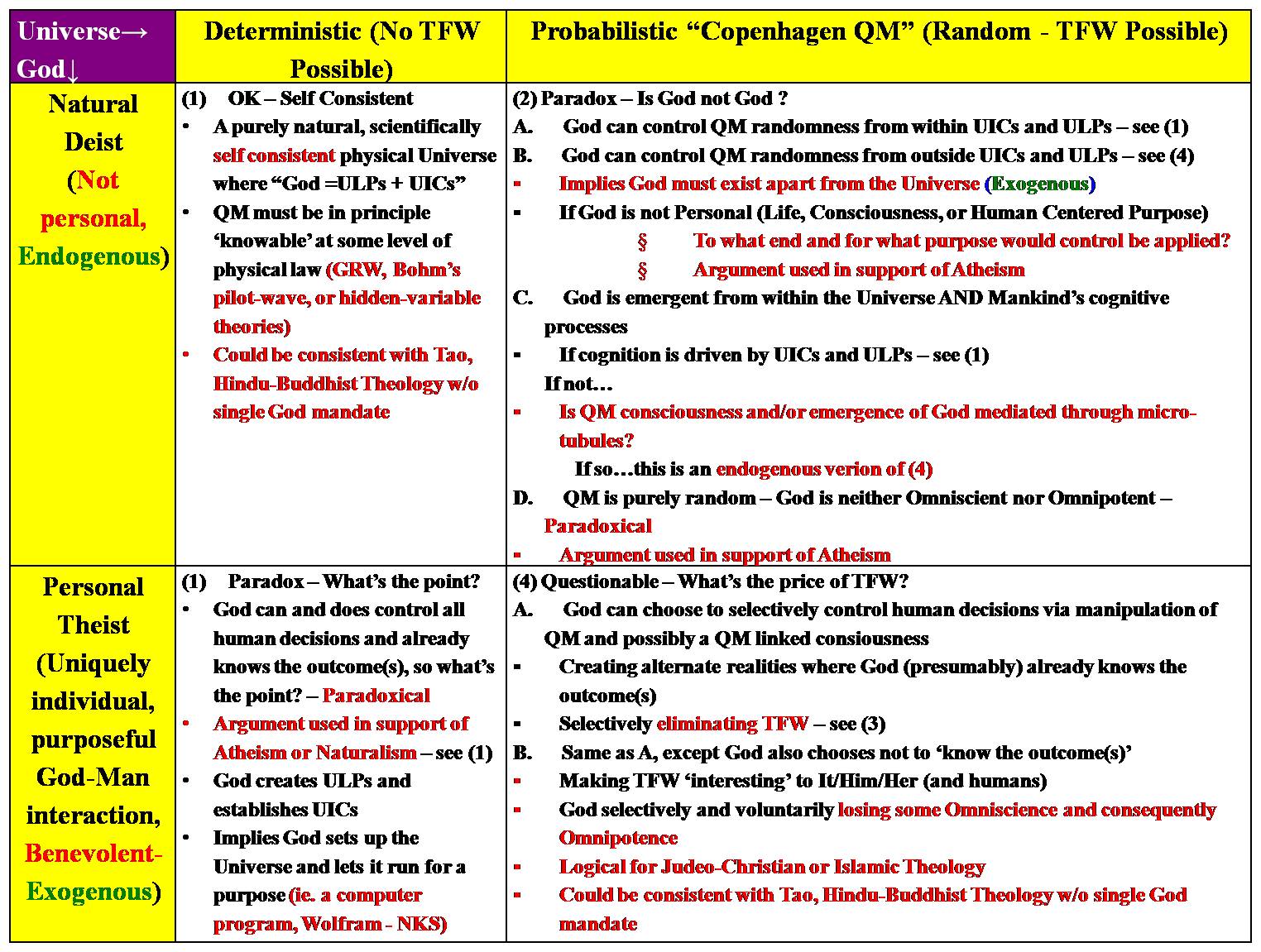If It exists, God is Omniscient AND Omnipotent.
- This implies uniqueness; thus God, not god(s):
- Omniscient = Knowledge of “All”
- Omnipotent = Control of “All”
- “All” is defined in physics as:
- Universal Laws of Physics (ULPs)
- Universal Initial Conditions (UICs)
- Infinite Detail of All Particles’ Information
- Position
- Momentum
- Velocity
- Mass / Energy
- Infinite Detail of All Particles’ Information
If it exists, True Free Will (TFW) is defined such that human decisions actually select and determine possible alternate realities. For TFW to exist, consciousness and human decisions can’t be pre-determined.
Cognitive Neurology combined with Quantum Mechanics (QM) identifies a mechanism (micro-tubules) for randomness to be linked with consciousness and possibly TFW (ala. Penrose).
In a deterministic Universe, when humans derive a Theory of Everything (TOE) and possibly learn to control the ULPs, the perception of TFW can exist (ie. we can’t predict the future) because it is, in principle, impossible to know the UICs.


The deterministic view (column 1) infers a an aspect of necessity on God, which contradicts the quality of “omnipotence”. The logical argument would be that omnoipotence implies the power to do something as well as the power not to do something. If all human action is controlled through an omnipotent supreme being then that being is incapable of letting humans direct their own actions. Making that incapability a necessary attribute of God contradicts the “all capable” quality inherent in omnipotence, ergo not omnipotent. Therefore either God is not omnipotent, or God does not control all human actions, because both cannot be true. Another reason that imposing a “God controls everything” view of the universe is problematic is crime and sin. Personal responsibility for actions requires that the person in question possesses the capability to act otherwise. This not only poses a problem for the social responsibility to act in a way that is not destructive to society, but also accountability for sin. Anyhow, you get the picture.
@Conrad – Yes you are correct.
To put it simply, in column 1 (as well as row 1) either TFW doesn’t exist (or God is not Omnipotent/Omniscient, thus god(s) plural is an option). This really leaves only box 4 for TFW and Omnipotence (albeit in limited forms).
As an interesting aside, there is now a theory that makes determinism and QM (local) randomness a percentage (vs. binary all or nothing). This has interesting implications for this chart. I am trying to work this into my research. It essentially fuzzes up the center point between the box 1 and box 4 (which seem to be the only ones with self-consistency).
I wonder how the percentages would work. Perhaps there is “partial omnipotence’ or “partial omniscience”, but wouldn’t partial contradict the “omni”? I will try to withhold judgement until I can see it spelled out better. Looking forward to how it integrates into your chart.
Yes, the whole “omni” and True (in TFW) become fuzzy.
This research in QM, specifically the Einstein-Podolsky-Rosen (EPR) Bell Inequality experiments, have to do with the physics of the Universe (defined by the columns).
Theologically, partial omnipotence is referenced in box 4 with God being willing to allow man to make choices, thus deferring omnipotence (which is, as I understand your point, at the heart it… is deferring power to choose allowed within the definition of being omnipotent?). Interestingly, this may not require any deference of omniscience though.
The idea is actually specifically addressed in New Testament Christian theology.
It is definitely an interesting process to try and take scientific implications and infer or deduce theological constraints.